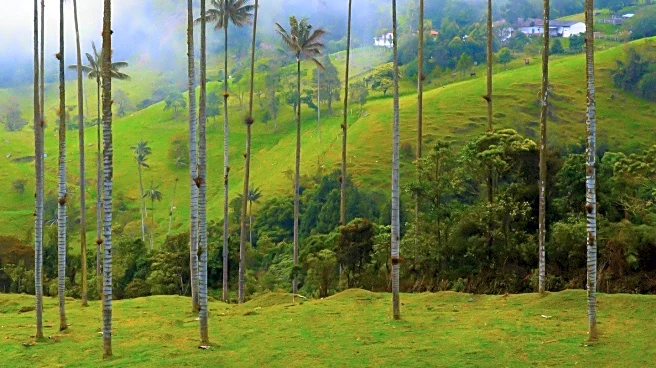What's Happening?
A new eco-gastronomic tourism initiative is set to launch in Atlántico, Colombia, as part of the TUI 'From Field to Fork' program. This project, funded by the TUI Care Foundation and executed by Slow Food in collaboration with Corporación Sabores & Saberes, aims to connect local producers, culinary experiences, and markets. The initiative seeks to promote sustainable livelihoods and reinforce community resilience by preserving local food systems and biodiversity. The project involves training local communities in agroecology and food processing, integrating traditional cooks, and connecting producers to urban markets. The pilot phase, scheduled for 2026, will introduce a Slow Food Travel itinerary to attract visitors and support the local economy.
Why It's Important?
This initiative is significant as it addresses critical challenges faced by the Atlántico region, such as climate stress, water scarcity, and soil degradation. By promoting sustainable agricultural practices and preserving culinary traditions, the project aims to enhance food sovereignty and create economic opportunities. The involvement of young people as agri-food agents is crucial for ensuring the long-term sustainability of these efforts. The initiative not only supports local communities but also offers a model for eco-gastronomic tourism that could be replicated in other regions facing similar challenges.
What's Next?
The next steps involve the implementation of the pilot phase in 2026, which will see the launch of the Slow Food Travel itinerary. This phase will focus on attracting tourists to the region, thereby creating sustainable livelihoods and reinforcing community resilience. The success of this initiative could lead to further expansion and adaptation of similar projects in other regions, potentially influencing global tourism and agricultural practices.
Beyond the Headlines
The project highlights the importance of preserving cultural heritage and biodiversity in the face of modern challenges. It underscores the potential of eco-gastronomic tourism as a tool for sustainable development, offering a unique blend of cultural preservation and economic growth. The initiative also emphasizes the role of community engagement and youth involvement in driving positive change.










